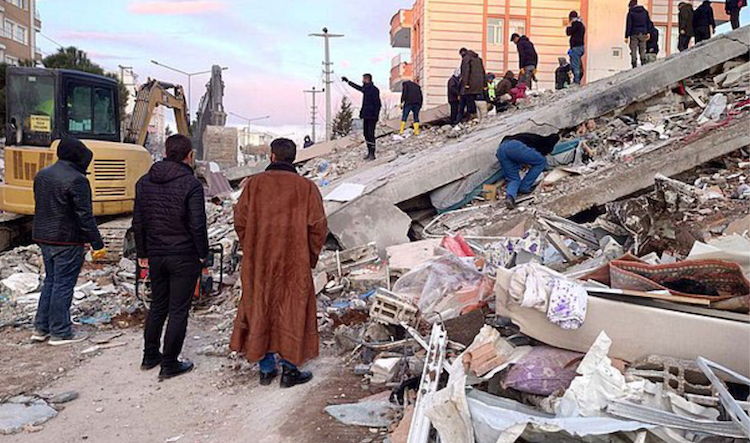By Thalif Deen
UNITED NATIONS, 23 Feb 2023 (IDN) — Syrian President Bashar al-Assad, accused of human rights abuses, war crimes and use of chemical weapons—is one of several authoritarian Middle Eastern leaders who never addressed the UN General Assembly or stepped into the United Nations.
Blacklisted by the US and Western nations for brutally suppressing a 12-year-long civil war, he either held the UN in contempt or most likely, feared being ousted from power if he was away from Damascus—and stayed home.
The February 6 earthquake reportedly killed or injured thousands of Syrians, mostly in the opposition-held northwest region.
Ironically, the earthquake has been a blessing in disguise for al-Assad who is being provided with millions of dollars in financial and humanitarian assistance by countries that once remained unfriendly towards Syria, including Saudi Arabia and the United Arab Emirates (UAE).
Among Arab nations, the UAE has reportedly donated about $100 million, while there are reports of an attempt to get Syria back into the 22-member League of Arab States (which currently stands at 21).
According to a Reuters report, Saudi Foreign Minister Prince Faisal bin Farhan said at the recent Munich security forum that consensus was building in the Arab world that isolating Syria was not working and that dialogue with Damascus was needed “at some point” to at least address humanitarian issues, including a return of refugees.
A headline in a February 17 report in the New York Times was dead on target: “Syria’s Quake Helps Pariah Creep Back onto World Stage.”
Addressing reporters February 22, UN Spokesperson Stephane Dujarric said: 17 trucks crossed Bab Al-Hawa and Bab Al-Salam carrying aid provided by UNHCR (United Nations Refugee Agency), the World Food Programme (WFP) and the World Health Organization (WHO).
A total of 282 UN trucks have passed through the three border crossings since 9 February.
“Our colleagues have found that the health sector has been particularly hard-hit in the earthquakes, with 47 health facilities having been reported as damaged in northwest of Syria alone. Twelve health facilities have suspended operations and 18 are only partially functional.”
The UN and its partners, mostly humanitarian organizations, have continued to scale up cross-border aid operations from Türkiye into north-west Syria.
Currently, there are 55 international and 810 national personnel working out of Syria.
Last week, 10 trucks carrying shelter and other items from the International Organization for Migration (IOM) crossed through the Al-Ra’ee border crossing into northern Aleppo.
“This is the first UN convoy through this border crossing since the Government of Syria agreed to its use for aid deliveries, which now brings us to three fully operating border crossings for the United Nations,” he said.
The UN High Commissioner for Refugees (UNHCR), the UN Development Programme (UNDP) and UN-Habitat are helping to conduct assessments of structural damage to buildings. These assessments will help determine whether families can return to homes that are deemed safe.
Dujarric said funding remains essential for the wider earthquake response. As of February 20, the Syria Flash Appeal was 17 per cent funded, with $68.5 million received towards the $329.1 million plan.
A Fact Sheet from the US State Department says the February 6 earthquakes that struck southeastern Türkiye and northern Syria have devastated millions of people.
Within hours of the first quake, the United States, at the direction of President Joe Biden, quickly mobilized federal agencies and partners to urgently provide life-saving assistance in close coordination with our NATO Ally Türkiye and partner organizations in Syria.
Biden intends to authorize $50 million in Emergency Refugee and Migration Assistance Funds (ERMA) “in response to the unprecedented and devastating earthquake in Türkiye and Syria”.
In addition, the United States is providing $50 million in humanitarian assistance through the State Department and USAID. This brings total US humanitarian assistance to support the earthquake response in Türkiye and Syria to $185 million to date.
The United States says “it is committed to expanding humanitarian access to all affected areas of Syria. In that regard, we are grateful to the Government of Türkiye for facilitating the UN’s renewed access to the Bab al-Salama crossing so aid can flow into northwest Syria, and we are supporting efforts at the UN to sustainably keep open additional crossing points for UN assistance between Türkiye and Syria.”
To underscore that US sanctions will not prevent or inhibit providing humanitarian assistance in Syria, the US Department of the Treasury issued a broad General License to provide additional authorizations for disaster relief assistance to the Syrian people circumventing current sanctions. [IDN-InDepthNews]
Image source: Wikimedia Commons.
IDN is the flagship agency of the Non-profit International Press Syndicate.
Visit us on Facebook and Twitter.
We believe in the free flow of information. Republish our articles for free, online or in print, under Creative Commons Attribution 4.0 International, except for articles that are republished with permission.

